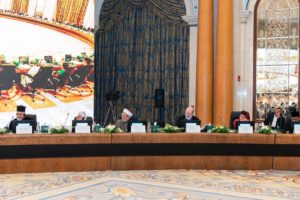All-Arab News
May 19, 2022
Evangelical pastor Bob Roberts writes that engagement with people of other faiths will lead to friendships – and that has to power to change the world.
Read entire article here on All Arab News here
This past week I attended the Forum on Common Values among Religious Followers which took place in Riyadh, Saudi Arabia.
Saudi Arabia is known for many things, not the least of which is their oil. In 1938 oil was found in Saudi Arabia for the first time, changing the trajectory of not only that nation, but also the world. I think it is possible that the trajectory that we saw from Saudi Arabia this past week could impact the world to an even greater degree, only this time it will not be oil making an impact, but peace.
 This forum was historic as something that has never happened before in Saudi Arabia’s history. It was historic because it was done with the blessing of the government. It was historic because essentially all the world’s major religions were represented.
This forum was historic as something that has never happened before in Saudi Arabia’s history. It was historic because it was done with the blessing of the government. It was historic because essentially all the world’s major religions were represented.
And it was historic because women were part of the event. There certainly could have been more women engaged, but many were there and some spoke, and their impact was significant.
In 2019, His Excellency Sheikh Mohammad bin Abdulkarim al-Issa, general secretary of the Muslim World League, and the convener of this event, penned the Charter of Makkah. This declaration was written by Muslims to Muslims and for Muslims. And, if followed, it will make the world a better place for everyone, as it deals with human rights, religious freedom and other issues that matter for all of human flourishing.
Not enough can be said about al-Issa’s courage. He is taking bold, aggressive steps to build bridges like few people in the world today. He is a once-in-a-hundred-year leader. There is no way that opportunities like this can advance without someone like him who has the vision, courage and connections to make it happen. I am glad to call him my friend.
Recently, I brought al-Issa to the United States and we visited three significant Christian churches where thousands gathered over that week to hear him explain the Charter of Makkah and respond to it. I was taken aback when he told me that he was going to host the first interfaith conference in Saudi Arabia’s history and wanted me to come. As I said previously, this has never before been done and yet he did it. Approximately 90 religious leaders from around the world gathered, gave speeches and talked about what it meant to make room for everyone in the world to freely practice their faith.
Why should we work with Saudi Arabia and her leaders, even knowing that their track record on human rights is challenging? These are serious issues, and should not be dismissed, but when someone moves forward in a positive direction, we should affirm those steps. The changes in Saudi Arabia are real; both those from the West who visit see it, as do citizens of the Saudi kingdom.
This is good. It is creating an atmosphere for others to stand up and lead the way. I work with them because if they become proponents of religious freedom, protecting the rights of religious minorities and demonstrating religious tolerance, they have the ability to impact and change the perspective of Muslims around the world, leading to diminishing extremism on a global level. It is important that we work together with anyone who has a desire to see peace advance, and who is taking steps in that direction.
This event is a strong example of that forward momentum. While the host Muslim World League represents all Muslim-majority nations, the event was held in Saudi Arabia, with the permission of the government. These forward steps were further seen in the Saudi Arabian Minister of State for Foreign Affairs Adel Al-Jubeir following diplomatic protocol as he received the Ecumenical Patriarch, Bartholomew I of Constantinople. These are steps in the right direction.
Coming out of that meeting the participants agreed to an action plan. They agreed to participate in an annual conference on the topic, they agreed to develop an encyclopedia on the topic and they agreed to develop a center for global religious diplomacy.
All of these are wonderful steps. And yet, something significant is missing – engagement.
When engagement on a grass roots level is present, this movement can be unstoppable. We currently see that the Muslim world has produced plenty of documents and hosted conferences over the last seven or eight years, but what is woefully lacking is the actualization of those documents through action founded in grass roots relationships.
This is where we live at the Multi-Faith Neighbors Network, connecting Muslims, Christians and Jews in relationship, seeing dialogue and working together happen, but seeing them rooted in authentic friendships. Friendships where we value one another, even as we disagree with each other. This must happen for any change to be substantive and lasting.
Saudi Arabia is the birthplace of the Prophet Mohammed and the place where Islam began. If Saudi Arabia is serious about change, religious freedom and protecting the rights of religious minorities, and if its leaders will give direction through this change to the rest of the world, it could be the most significant game changer of this century.
The game changer of the last century was oil. Why can’t the game changer for this century be peace?
Read entire article here on All Arab News here